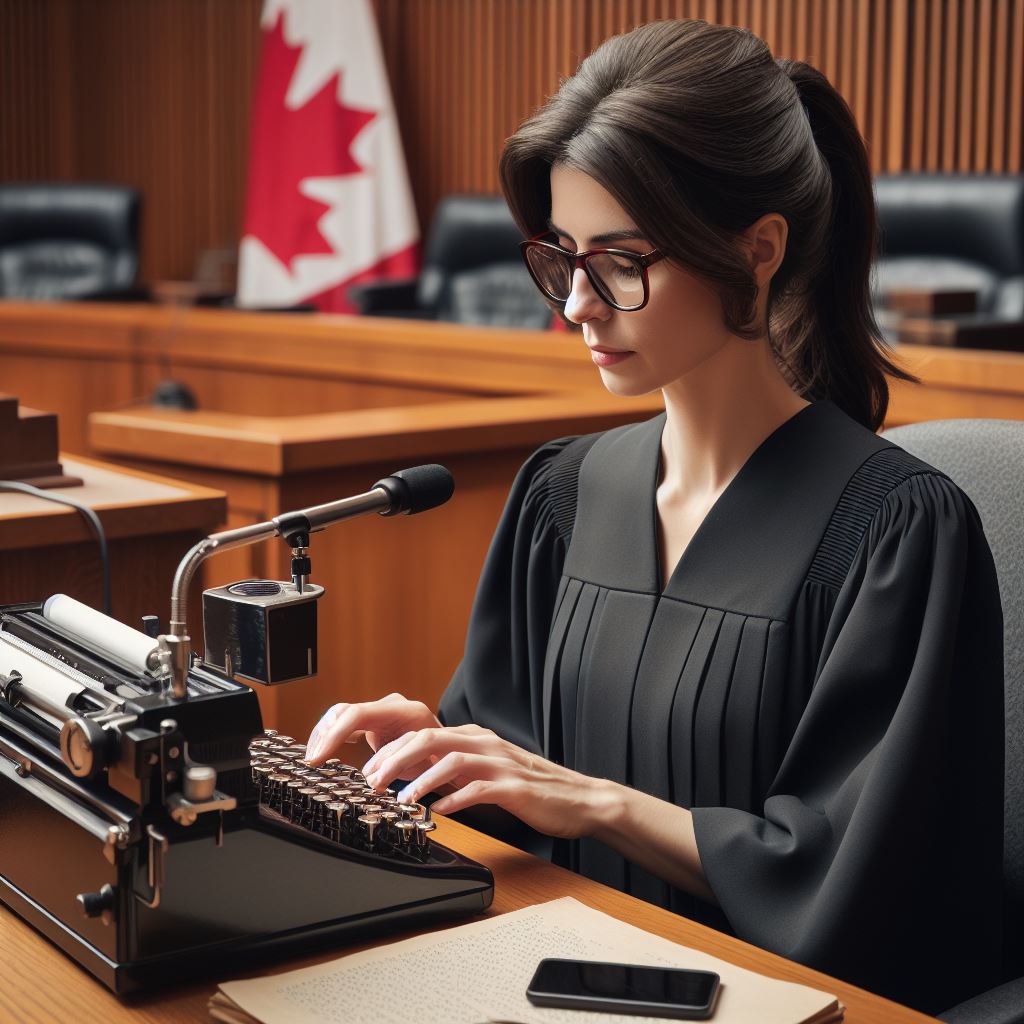Introduction
Court reporting work involves creating verbatim transcripts of legal proceedings and depositions.
Confidentiality is crucial in court reporting to protect sensitive information and ensure privacy.
The purpose of this blog post is to highlight the significance of confidentiality in court reporting.
Importance of Confidentiality in Court Reporting
Confidentiality is vital in court reporting to safeguard the privacy of individuals involved in legal proceedings.
Maintaining confidentiality ensures that sensitive information disclosed during court proceedings remains protected.
Court reporters are entrusted with a duty to preserve the integrity and confidentiality of the legal process.
Without confidentiality, individuals may feel reluctant to share sensitive information, hindering the judicial system.
The principle of confidentiality builds trust among the parties involved and encourages open communication.
Court reporters play a crucial role in upholding the ethical standards of the legal profession.
Adhering to strict confidentiality guidelines ensures that court reporters maintain the highest level of professionalism.
Confidentiality also extends to the handling and storage of court reporting transcripts to maintain their integrity.
By prioritizing confidentiality, court reporters contribute to the fair administration of justice and uphold the rule of law.
Overall, confidentiality is essential in court reporting to protect the privacy and integrity of the legal process.
In fact, confidentiality plays a pivotal role in court reporting, ensuring privacy and trust within the judicial system.
Court reporters have a responsibility to uphold the principles of confidentiality to preserve the integrity of the legal process.
By maintaining strict confidentiality, court reporters contribute to the fair administration of justice and protect the sensitive information disclosed during court proceedings.
Understanding Confidentiality in Court Reporting Work
Definition of confidentiality in a legal context
Confidentiality in court reporting work refers to the obligation of court reporters to protect and safeguard sensitive information disclosed during legal proceedings.
The court reporter must ensure that all information disclosed in the courtroom remains confidential and is not shared with unauthorized individuals.
Confidentiality is crucial to maintain the integrity of the legal process and protect the privacy rights of the parties involved.
Code of ethics for court reporters
Court reporters are bound by a code of ethics that emphasizes the importance of confidentiality in their profession.
This code outlines the responsibilities and professional standards that court reporters must adhere to, including strict confidentiality guidelines.
These ethical guidelines require court reporters to handle all confidential information with the utmost care and only disclose it when authorized by law or the parties involved.
Role of court reporters in protecting confidentiality
Court reporters play a critical role in ensuring the confidentiality of court proceedings and maintaining the trust of the legal system.
They are responsible for creating accurate and verbatim records of all spoken and written words during a trial or deposition.
In addition to transcribing the proceedings, court reporters are entrusted with protecting the confidentiality of sensitive information.
Unlock Your Career Potential
Visualize a clear path to success with our tailored Career Consulting service. Personalized insights in just 1-3 days.
Get StartedThis means they must exercise discretion and take all necessary precautions to prevent unauthorized access, tampering, or disclosure of any confidential materials.
Court reporters are also required to securely store and dispose of confidential documents, ensuring they are not accessible to unauthorized individuals.
By upholding these responsibilities, court reporters contribute to the fair administration of justice and help safeguard the rights and interests of all parties involved in legal proceedings.
Confidentiality is an essential aspect of court reporting work, ensuring the privacy and protection of sensitive information in a legal context.
Court reporters must adhere to a code of ethics that emphasizes strict confidentiality guidelines, helping to maintain the integrity of the legal process.
With their role as guardians of confidential information, court reporters play a crucial part in safeguarding the rights and interests of all parties involved in legal proceedings.
By fulfilling their duties with integrity and discretion, court reporters contribute to the fair and effective administration of justice.
Confidentiality Obligations for Court Reporters
A court reporter’s role in legal proceedings is crucial, as they are responsible for creating an accurate record of court hearings, trials, and depositions.
However, their work also carries an inherent obligation to maintain confidentiality.
In this blog section, we will explore the various aspects of confidentiality in court reporting work and the measures court reporters must take to uphold this obligation.
Federal and Provincial Laws Regarding Confidentiality
Court reporters operate within the framework of both federal and provincial laws, which dictate the level of confidentiality they must maintain.
These laws are designed to protect the privacy and interests of all parties involved in legal proceedings.
- Legislation such as the Federal Rules of Civil Procedure and state-specific statutes outline the parameters of confidentiality.
- Court reporters must familiarize themselves with these laws and strictly adhere to the guidelines they provide.
- Violating confidentiality laws can have severe consequences, including legal penalties and damage to a court reporter’s professional reputation.
Non-Disclosure Agreements and Contracts
In addition to legal frameworks, court reporters often enter into non-disclosure agreements (NDAs) or contracts with their clients or employers.
These agreements serve as an additional layer of protection for sensitive information and underscore the importance of confidentiality.
- NDAs explicitly state that court reporters cannot disclose any confidential or privileged information obtained during proceedings.
- Contracts may outline the consequences of breaching confidentiality, such as termination of employment or legal action.
- Court reporters must carefully review, understand, and abide by the terms of these agreements to fulfill their professional obligations.
Ensuring Confidentiality During Court Proceedings and Depositions
During court proceedings and depositions, court reporters must take specific measures to guarantee the confidentiality of the information entrusted to them.
- Court reporters should always maintain a professional and impartial demeanor, treating all information as confidential regardless of its sensitivity.
- They must securely store physical and electronic records, ensuring they are not accessible to unauthorized individuals.
- When handling sensitive documents, court reporters should take precautions such as using password-protected devices and encrypted communication channels.
- Professional ethics demand that court reporters refrain from discussing case details with anyone outside of the legal proceedings, including friends, family, or colleagues.
- In situations where court reporters must collaborate with others, such as proofreaders or transcriptionists, they must ensure these individuals also adhere to strict confidentiality standards.
- It is vital for court reporters to maintain confidentiality even after the conclusion of a case, as some information may remain sensitive or subject to future litigation.
In essence, confidentiality is paramount in court reporting work, and court reporters have a legal and ethical responsibility to protect the privacy and integrity of the legal system.
By understanding and complying with federal and provincial laws, as well as non-disclosure agreements, court reporters can uphold their obligations and play a crucial role in maintaining justice.
Read: How to Become a Court Reporter in Canada

Challenges and Ethical Dilemmas
Balancing confidentiality with the public’s right to information
In court reporting work, one of the key challenges is striking a balance between maintaining confidentiality and upholding the public’s right to information.
Court reporters play a crucial role in ensuring accurate and unbiased reporting of legal proceedings. However, they are also bound by ethical obligations to maintain confidentiality.
The public’s right to information allows for transparency in the judicial process and promotes accountability. It ensures that justice is served without any hidden agendas or biases.
However, there are instances where the information disclosed in court proceedings is sensitive or private, such as cases involving juveniles or victims of sexual assault. In these situations, court reporters face a dilemma.
They must carefully consider whether disclosing certain information may violate the confidentiality of the parties involved or have potential consequences on their lives.
Striking the right balance requires court reporters to exercise sound judgment and adhere to professional ethics. They must assess the significance of the information in the context of public interest and potential harm to individuals.
This ethical dilemma can be particularly challenging in high-profile cases where public interest is high, and the media seeks access to sensitive information.
Court reporters must navigate through complex legal and ethical frameworks to ensure that the public’s right to information is respected while preserving the confidentiality of the parties involved.
Handling sensitive and classified information
Another significant challenge in court reporting work is dealing with sensitive and classified information.
During legal proceedings, court reporters often come across information that is classified or of a highly sensitive nature.
Examples include national security issues, trade secrets, or classified documents presented as evidence. The court reporter’s role is to transcribe these proceedings while respecting the confidentiality of such information.
This presents a unique challenge, as court reporters must maintain the confidentiality of classified information while ensuring an accurate and comprehensive record of the proceedings.
They must follow strict protocols and guidelines to handle the information securely. This may involve working in secure environments or using encrypted communication systems.
Furthermore, court reporters may be required to sign non-disclosure agreements or undergo security clearance to gain access to certain cases.
Handling sensitive and classified information requires court reporters to uphold the highest standards of professionalism and integrity.
They must prioritize the confidentiality of such information, understanding the potential implications of any disclosure.
While maintaining accuracy and transparency in their reporting, court reporters must also respect the boundaries set by the law and the importance of national security.
Dealing with conflicting interests during court reporting
Conflicting interests can emerge during court reporting, posing ethical dilemmas for court reporters.
Reporters may encounter situations where their personal or professional interests come into conflict with their obligation to maintain confidentiality.
For instance, a court reporter may have a personal relationship with one of the parties involved in a case, potentially compromising their impartiality and objectivity.
In such cases, court reporters must disclose any conflicts of interest and recuse themselves from the reporting to ensure unbiased coverage.
Furthermore, court reporters may face pressure from external sources, such as media organizations or the public, to disclose confidential information.
They must resist such pressures and adhere to their professional and ethical obligations, prioritizing confidentiality over personal or public demands.
Navigating conflicting interests requires court reporters to possess a strong moral compass and a commitment to upholding the principles of their profession.
They must be aware of their biases and potential conflicts and take appropriate measures to ensure fair and unbiased court reporting.
In general, court reporters face numerous challenges and ethical dilemmas in maintaining confidentiality while fulfilling the public’s right to information.
Striking a balance between these two aspects is crucial for court reporters in preserving the integrity of the judicial system.
By upholding professional ethics and navigating through complex legal frameworks, court reporters play a vital role in providing accurate and unbiased reporting of legal proceedings.
Read: A Day in the Life of a Canadian Court Reporter
Consequences of Breaching Confidentiality
In the field of court reporting, maintaining strict confidentiality is paramount to uphold the integrity of the justice system.
However, breaching this trust can have severe consequences for court reporters.
Legal ramifications for court reporters
- Violation of confidentiality can result in legal actions, including lawsuits and criminal charges.
- Court reporters may be held in contempt of court for disclosing confidential information.
- Legal penalties can include fines, imprisonment, and permanent damage to one’s professional reputation.
- Prosecution and legal battles can cause significant stress, financial burden, and potential loss of employment.
Professional reputation and career implications
- Breaching confidentiality erodes trust and damages the court reporter’s professional reputation.
- Negative publicity and media coverage may follow a breach, hindering future job opportunities.
- Clients, attorneys, and judges are unlikely to hire a court reporter with a tarnished reputation.
- Court reporting associations may take disciplinary actions, including revoking certifications or memberships.
Impact on the fairness and integrity of the justice system
- Confidentiality breaches undermine the fundamental principles of the justice system.
- Disclosures can compromise the privacy and safety of individuals involved in court cases.
- Witnesses, victims, and defendants may refrain from sharing crucial information due to breach concerns.
- This can hinder the pursuit of truth and justice, leading to unfair outcomes in legal proceedings.
- Public trust in the legal system diminishes when confidentiality is violated, impacting overall faith in justice.
In short, breaching confidentiality in court reporting not only brings legal consequences but also jeopardizes a court reporter’s professional standing and compromises the justice system’s integrity.
Upholding confidentiality is essential to maintain trust, protect individuals involved, and ensure a fair legal process.
Read: Crafting the Perfect Legal Assistant Resume
Uncover the Details: How to Excel in Your First Legal Assistant Job
Best Practices for Maintaining Confidentiality
Creating secure transcript storage and handling systems
- Implement password-protected systems to ensure access is limited to authorized individuals.
- Utilize encryption tools to safeguard transcripts from unauthorized interception or access.
- Store physical transcripts in locked cabinets or rooms that can only be accessed by authorized personnel.
- Implement a clear chain of custody process to track the movement of transcripts and prevent tampering.
- Regularly review and update security measures to adapt to evolving technology and potential threats.
Utilizing secure digital platforms for sharing transcripts
- Choose reputable digital platforms that prioritize confidentiality and have strong security features in place.
- Use secure file transfer protocols (SFTP) or virtual private networks (VPNs) to ensure encrypted transmission of transcripts.
- Limit access to digital transcripts by utilizing password protection and multi-factor authentication.
- Regularly update and patch digital platforms to address any identified vulnerabilities.
- Train court reporters and other staff members on the proper use of digital platforms and security protocols.
Developing a culture of confidentiality within the court reporting profession
- Educate court reporters on the importance of confidentiality and the potential consequences of breaches.
- Establish clear confidentiality policies and procedures that all court reporters must adhere to.
- Regularly reinforce confidentiality guidelines through training sessions and workshops.
- Encourage court reporters to report any potential security breaches or violations of confidentiality.
- Foster a supportive and accountable work environment where confidentiality is valued and prioritized.
Maintaining confidentiality within court reporting work is crucial to protect the integrity of the legal system.
By implementing secure transcript storage and handling systems, utilizing secure digital platforms, and fostering a culture of confidentiality, court reporters can ensure the privacy and security of their transcripts.
These best practices not only safeguard sensitive information but also uphold the trust placed in court reporters by legal professionals and the public.
Read: Continuing Education for Legal Assistants
Conclusion
Confidentiality plays a crucial role in the work of court reporters. It ensures the integrity of the judicial process by protecting sensitive information.
Court reporters must prioritize confidentiality to maintain trust and uphold ethical standards.
By adhering to confidentiality guidelines, court reporters contribute to the fair administration of justice.
The importance of confidentiality cannot be overstated, as it safeguards the privacy and rights of individuals involved in legal proceedings.
Therefore, court reporters should approach each case with a deep understanding of their responsibility to maintain confidentiality.
In summary, court reporters should always prioritize confidentiality, as it is essential for the proper functioning of the justice system.
Through their commitment to confidentiality, court reporters uphold the principles of fairness and justice.
Let us continue to discuss and promote adherence to confidentiality guidelines to ensure the highest level of professionalism and trust in court reporting.




